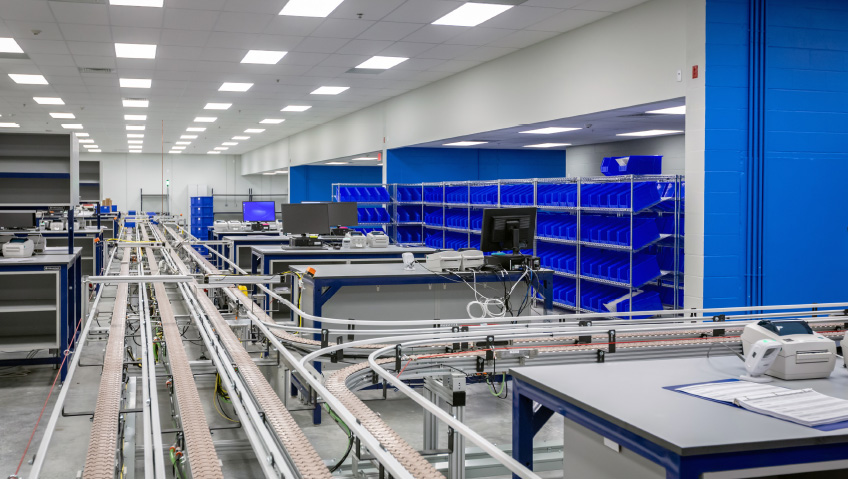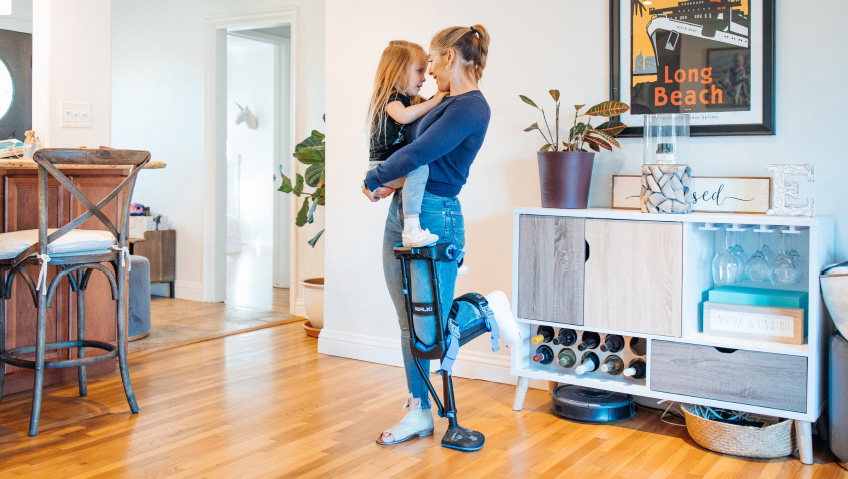“When sustainability is viewed as being a matter of survival for your business, I believe you can create massive change.”
— Cameron Sinclair, Open Architecture Network
As climate change and environmental concerns continue to mount and the world searches for sustainable solutions, industrial practices are under scrutiny like never before. In an effort to reduce adverse effects on social, economic, and environmental relationships, ecological awareness and a judicious use of natural resources are imperative. When it comes to Industry 4.0—the integration of intelligent machines in an advanced and networked production process—sustainable development is truly possible if companies take the initiative to save resources and energy, and lower their carbon emissions.
Industry 4.0 is being embraced by more and more businesses every day, along with Smart Factories, which work hand-in-hand with artificial intelligence (AI) to achieve maximum efficiency and profitability. With production being one of the key forces shaping modern society, Industry 4.0 has significantly impacted the environment, and while it can provide invaluable benefits, it also remains one of the primary sources of environmental pollution on a worldwide scale.
In order to combat the damage, both society and big business must start addressing sustainability, pollution, and climate change by more than simply reducing pollutants and carbon emissions—developing and growing both environmentally and socially are also imperative. Construction and manufacturing firms now have many more options to help them enter a sustainable era thanks to smart technology.
According to the Sustainable Development Goals of the United Nations, sustainability is considered the fundamental business strategy for the future and involves supporting initiatives such as smart manufacturing, energy-efficient construction, and low-impact industrialization. Industry 4.0 achieves this by fusing traditional manufacturing processes with digital technology, AI, and the Internet of Things (IoT).
To effectively combat environmental conditions and ensure a sustainable future, businesses and organizations must act sooner rather than later, but the good news is that Industry 4.0 technology could cut emissions by up to 15 percent by 2030, through the fusion of physical processes and digital communication.
For instance, networked IoT sensors in a sustainable smart building can self-regulate energy use based on current demand and usage, while organizations are able to further increase efficiency, streamline operations, and foster growth thanks to big data tools like AI, machine learning, and real-time data processing. In terms of sustainable development, this suggests factories could become more energy-efficient and leaner, and could emit less carbon.
Industry 4.0 has numerous potential implementations in the construction industry, from initial design to continuous management, and with the help of new technologies, sustainable design and architecture are now possible. Building Information Modeling (BIM) software is one of the technologies that architects currently utilize to improve structures for sustainability, incorporating organically repairing features like eco-friendly microorganisms into the design of commercial and industrial buildings.
Once installed, heating and cooling systems are capable of real-time self-regulation for energy efficiency, while sensors and IoT devices alert the environmental control systems to turn off the lights and air conditioning whenever people leave a room. In short, Industry 4.0 is revolutionizing sustainable construction by allowing smart buildings to function efficiently.
Buildings may eventually be completely closed-loop in terms of resource usage, energy consumption, and sustainability thanks to Industry 4.0 technology. The effluent may be recycled and purified automatically, while AI systems continuously analyze data to make modifications in real time for more environmentally friendly energy use.
The manufacturing industry already has an attitude of sustainability. Success and profitability depend on maximizing output while reducing waste, and as more businesses reorient their manufacturing processes to be more environmentally friendly or to adhere to regulations, success will follow. Lean manufacturing practices have long been the norm, and Industry 4.0 is starting to really push us toward tomorrow’s smart factory.
Smart vehicles can transfer data to a cloud server for analysis throughout the supply chain as part of the industrial industry’s 4.0 initiative, and the most environmentally friendly routes or transportation options can then be determined by an AI system. Industry 4.0 environmental controls go beyond heating and cooling in industrial settings, with smart filtration sensors recognizing an increase in a particular chemical or pollutant and immediately taking action to safeguard the health and safety of production workers.
Is it possible for industrial businesses to grow without sacrificing environmental protection? In essence, yes, if the business is willing to put in the effort.
Industry applications for Industry 4.0 impact every area of a business, including its infrastructure in addition to the production system. To enhance customers’ and employees’ daily lives, architecture is also evolving and reinventing itself through AI-powered buildings and massive factories that have the capacity to maximize a significant portion of their assets.
For instance, a real-time-controllable smart heating and cooling system can be added while constructing a smart factory, and a variety of sensors can be fitted to monitor and control the temperature of any space, saving money on energy and improving sustainability.
These kinds of characteristics can be easily regulated with an integrated operations platform, lowering gas emissions and attaining sustainability objectives. This technology enables the worldwide management of production, energy consumption, and carbon emissions by unifying data from external databases, such as Supervisory Control And Data Acquisition (SCADA) systems or Enterprise Resource Planning (ERP) systems.
While Industry 4.0 must adjust to this new paradigm in order to meet the needs of a society that values sustainability and environmental preservation, many businesses are unsure about how to approach a digitalization process that promotes sustainability and ethical production. Combining the problem of digital transformation and sustainability is a struggle for many companies, and while there isn’t a single solution to this issue, each organization will need to embrace a personal, customized digitalization strategy, with sustainability as a non-negotiable goal.
Combating the effects of climate change without sacrificing high-performance manufacturing is one of the most significant issues for Industry 4.0, making efficient and optimized production vital via industry-applied AI and advanced analytics. The industrial sector—which consumes the most energy—in looking to increase energy efficiency can prevent energy waste and increase productivity while making smarter savings by collecting and visualizing data.
Indeed, the Smart Factory idea is already putting sustainability and energy efficiency into practice. Increasing efficiency, minimizing waste, and optimizing production are all goals directly tied to protecting the environment, making Industry 4.0 a valuable resource for industries of the future.
Energy consumption will be directly impacted by turning an industrial business into a smart business. Using IoT technology to increase asset control allows for improved consumption tracking and more responsible and intelligent resource management. In order to achieve zero waste, Industry 4.0 promotes communication between various process elements, including circular waste management. Rework reduction is made possible by the application of mistake prevention and predictive maintenance approaches, forecasting leakage through efficient asset and production process monitoring and centralized data management.
As they continue to gain traction, sustainability practices are now becoming a key component of manufacturers’ business strategies, as companies are adopting sustainable practices because clients, staff, and investors expect them to “do what is right,” not just because they must abide by legislation, care about the environment, or want to conserve resources. In accordance with a report on a sustainability survey by the National Association of Manufacturers (NAM), around 76 percent of its member companies in North America have adopted or are developing sustainability policies.
Industrial manufacturing uses a significant amount of water, energy, dangerous chemicals, and material resources, and produces large amounts of waste and greenhouse gas emissions. With many new technologies assisting manufacturers in putting sustainable plans into practice on the shop floor, implementing these practices to reduce carbon emissions and create a circular economy will help the manufacturing sector to serve as an example of sustainability.
Manufacturing businesses may reinvent their operations while attaining Environmental, Social, and Governance (ESG) objectives thanks to digital technologies like cloud computing, 3D printing, robotics, AI, and Machine Learning (ML). ESG systems based on AI and ML give real-time data gathered throughout production activities that manufacturers then evaluate to discover procedures and practices that are limiting the achievement of sustainability goals. They can help reduce the environmental impact by cutting carbon emissions throughout sourcing, production, packaging, distribution, disposal, and business support operations, while data about high energy use by machines, for instance, can be used to find opportunities to cut waste.
Designing sustainable products is now not only possible but essential. Manufacturers must adopt a product lifecycle strategy to reduce carbon emissions throughout the production value chain by creating products that adhere to the sustainability 4Rs: reduce, recover, recycle, and reuse. Enabling designers to test cutting-edge ideas via digital design tools can raise the sustainability quotient and decrease resource intensity, lower product weight and volume, and boost the 4R value without major capital outlay.
A company’s sustainability policy must also include reducing waste of energy, water, and raw materials, and numerous companies use cutting-edge manufacturing techniques to meet their ESG goals.
Additionally, an Industry 4.0 ecosystem gives manufacturers the tools they need to work together both inside and outside the company to conserve natural resources and encourage carbon efficiency. By optimizing the delivery route of transportation management systems in real time, AI-driven automation makes warehousing and logistics operations smarter. It also helps conserve resources and reduce waste. Producers can also create new procedures and alternative models with AI systems to increase operational efficiency.
Ultimately, a successful partnership between business expansion and environmental sustainability with the assistance of Industry 4.0 is a possible and essential goal. Construction and manufacturing are, in many respects, the pillars of the global economy, and in order to support those industries’ strong, intelligent, and sustainable growth, business leaders need to look at technologies like connected factory equipment, AI-enabled energy systems, and industrial IoT devices.
By prioritizing and promoting sustainability as a top commercial concern in addition to a social responsibility with the aid of Industry 4.0 technology, manufacturers can not only advance production and boost business, but help safeguard the planet for generations to come.






